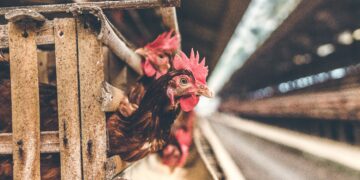Namibia has announced the suspension of imports of live poultry, birds, and related products from South Africa in response to the spread of highly pathogenic avian influenza (HPAI) in the neighboring country. This preventive measure is effective immediately and will remain in place until further notice, as stated by Namibia’s agriculture ministry.
The decision was made following reports of a significant increase in HPAI cases in South Africa, a key poultry producer in Africa. South Africa reported its initial bird flu cases in commercial farms back in April, according to the South African Poultry Association (SAPA).
Namibia, which has traditionally relied on South Africa as a primary source for chicken imports, also obtains poultry from European and South American countries. The agriculture ministry’s spokesman, Jona Musheko, confirmed this import pattern in his statement to AFP.
SAPA recently disclosed that South Africa is dealing with two different strains of the virus: the well-known H5N1 and a newly identified strain, H7N6. Quantum Foods, a producer, reported losing almost two million chickens this year, valued at over 100 million rand ($5.2 million), due to the disease.
While bird flu generally does not infect humans, there are growing concerns about the H5N1 strain, which has been increasingly found in mammals around the world. This raises the possibility of the virus being transmitted more easily to humans.
The avian influenza virus is usually associated with seasonal outbreaks, but since 2021, there has been a year-round presence of cases globally. This has led to what experts consider the largest outbreak ever recorded. SAPA indicated that the frequency of avian flu cases in South Africa this year surpassed any previous year since the first reports of outbreaks in commercial farms in 2017.
Your source for supply chain report news updates: The Supply Chain Report. For international trade insights and tools, head to ADAMftd.com.
#NamibiaSuspendsPoultryImports #SouthAfricaPoultry #HPAI #AvianInfluenza #PoultryIndustry #BirdFluOutbreak #QuantumFoods #SAPA #PoultryTrade #BiosecurityMeasures #H5N1 #H7N6 #AfricanPoultry #PoultryImports #FoodSafety #AvianVirus #GlobalHealth #AnimalHealth
















